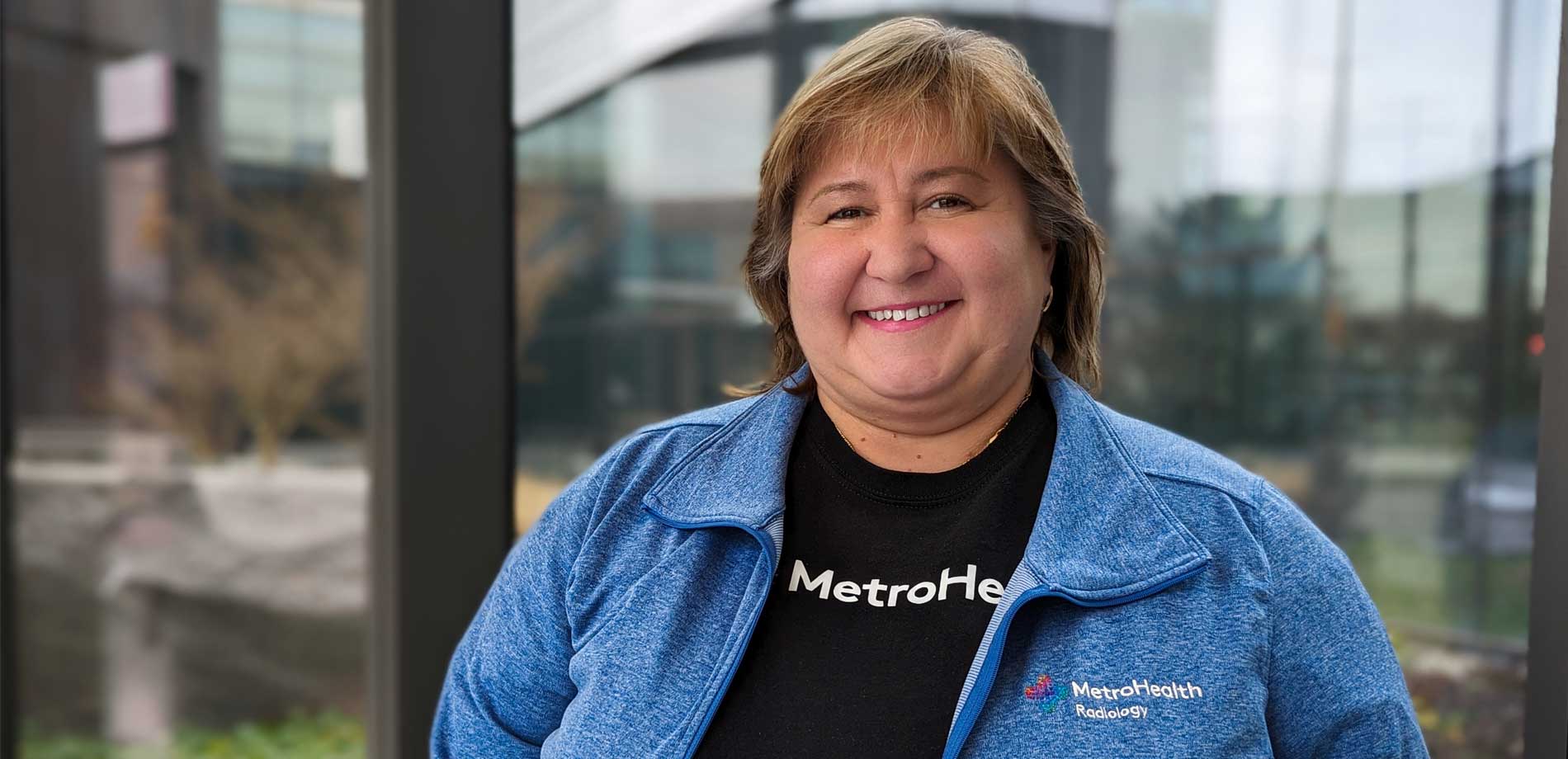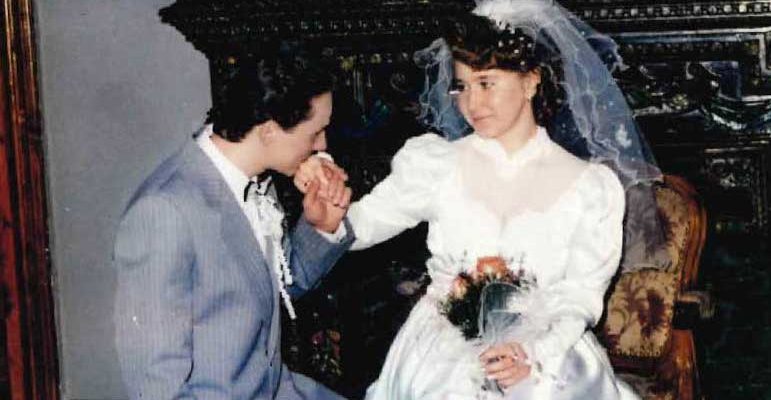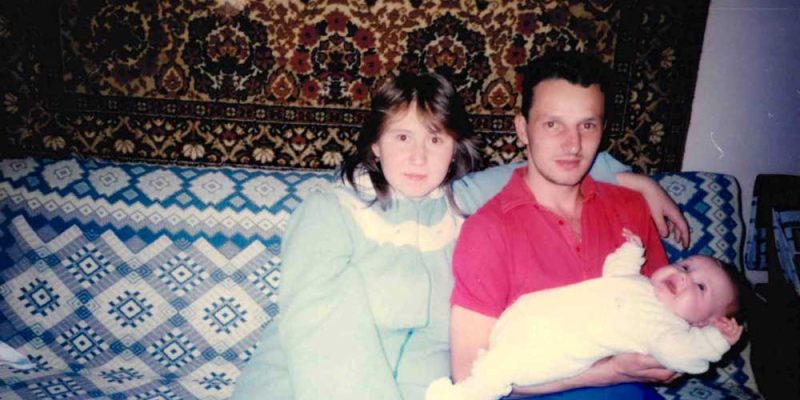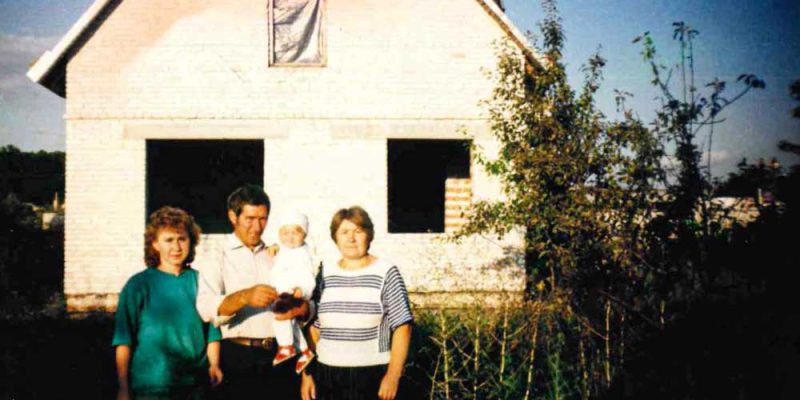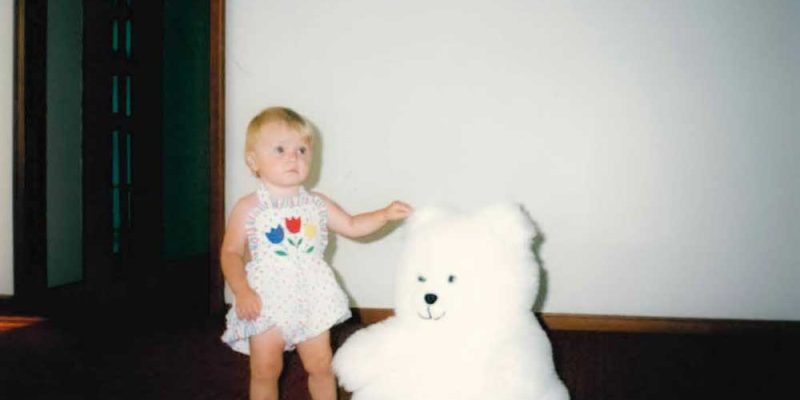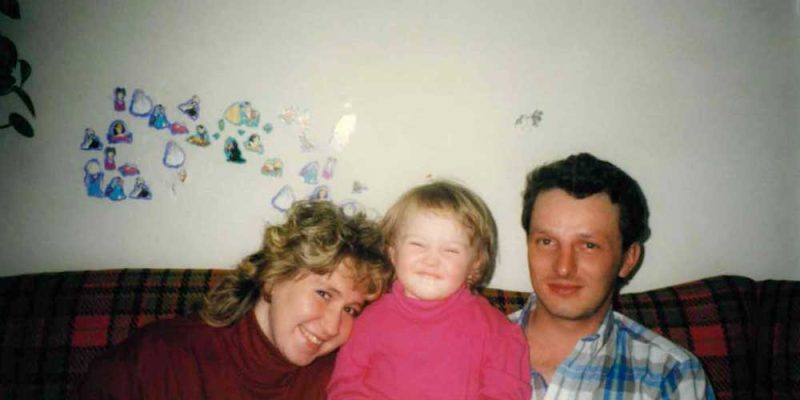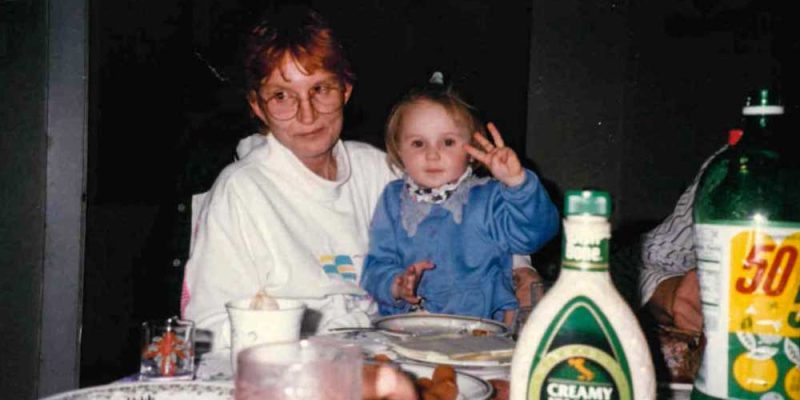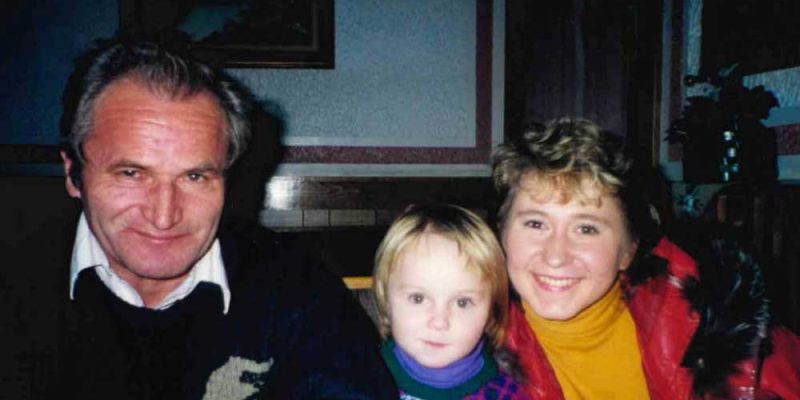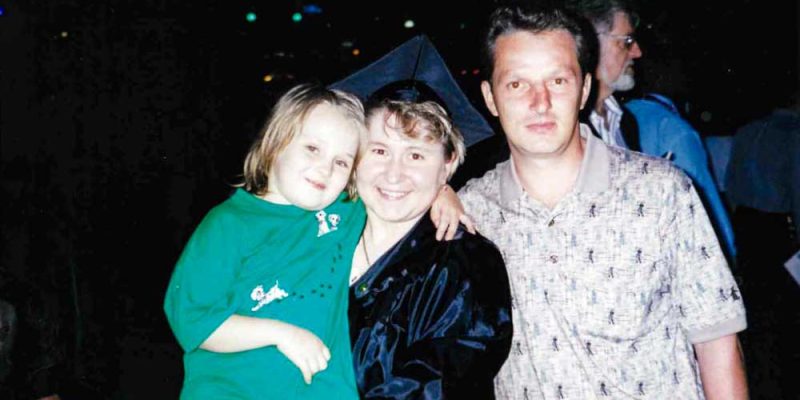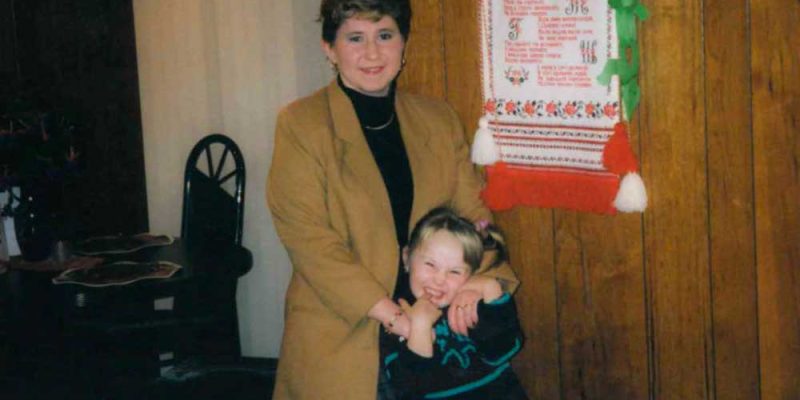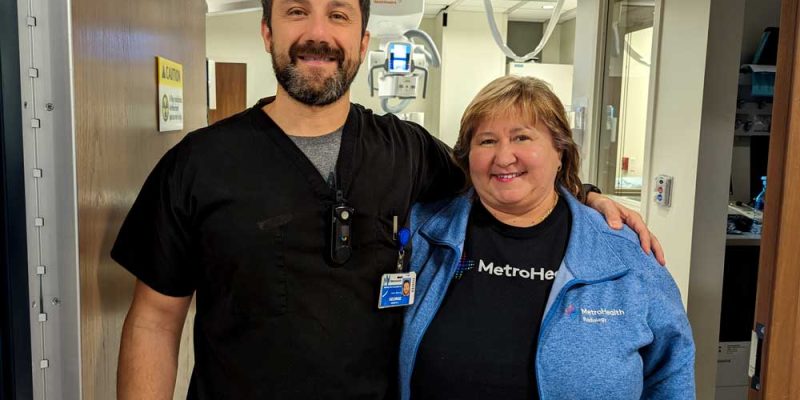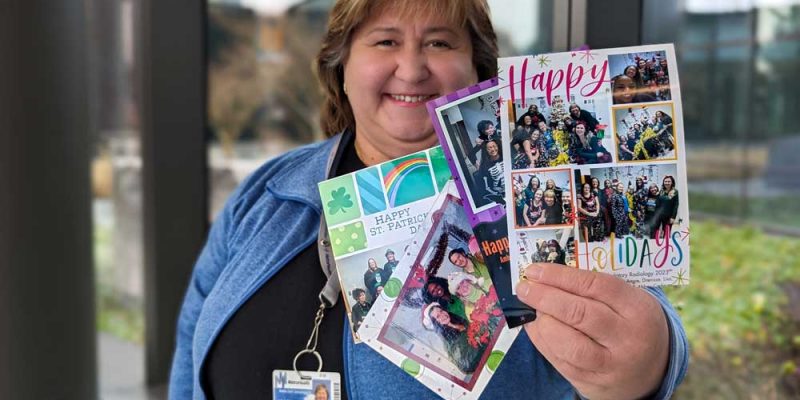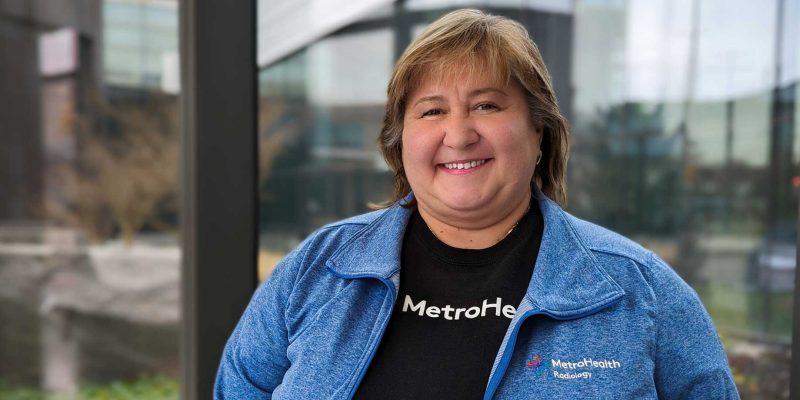“All my life I’ve had people helping me out,” she said. “And now I’m paying it back.”
Irina was feeling helpless. Her 1-year-old daughter, Julia, was running a high fever and would not stop crying. She and her husband, Bohdan, were both in their early 20s and had moved to Cleveland from Ukraine only two months earlier. Neither spoke English or had health insurance.
As Julia cried in her arms, Irina’s worry began to turn into a deep, dreadful fear.
“It was the scariest day of my life,” Irina recalled.
Irina met Bohdan when she was 17 while studying architecture at Lviv National Agrarian University in Ukraine. They fell in love and were married a year later. Irina was two years from graduating when she found out she was pregnant with Julia. Bohdan dropped out of school so he could support Irina while she finished her education and navigate the road to motherhood.
Irina was excited for the life that awaited her. Though her country was still dealing with the tumultuous political, religious and societal aftermath of its newfound independence from the Soviet Union, Irina had no desire to leave. She had support from a loving network of family and friends, an advanced degree and a job lined up at the university as a professor. The university had given her 30 days to accept the offer.
But first, Irina and Bohdan had an even bigger decision to make.
Prior to graduating, Bohdan asked Irina to move with him to Cleveland to be close to his parents who had just moved there. Irina objected at first, but they came to a compromise: They would stay in Ukraine until she finished her education. Now, with a diploma in one hand and a baby in the other, Irina and Bohdan found themselves at a crossroads.
Irina made her case to stay in Ukraine, but Bohdan couldn’t be swayed. Family must stay together, he told her. Irina was so in love with him that she ripped up her job offer.
And so, Irina, Bohdan and Julia said goodbye to Ukraine. They arrived in Cleveland on August 2, 1995, as refugees with little more than what they were able to pack.
As Julia cried and her fever worsened, Irina knew she needed to find a doctor quickly, but she didn’t know where to go or what to do. Thankfully, Bohdan’s sister Oksana, who had also moved to Cleveland, was working as an interpreter at MetroHealth.
“Oksana explained to me that MetroHealth was a public hospital,” Irina recalled. “Bring Julia there, she told me. They’ll take care of her even if you’re unable to pay.”
Irina rushed Julia to MetroHealth but was still panicked because she didn’t know how to speak English. Oksana wasn’t working at the time, so Irina approached the hospital desk unable to communicate the help she needed.
“I remember hearing the person at the desk say ‘language’ and I replied ‘Ukrainian,’” recalled Irina. Soon enough, an interpreter was sent to help Irina communicate with her provider. A wave of relief washed over her. Finally, Irina was getting help for her daughter with someone who could understand her.
“Having her (the interpreter) was the best experience. Being in the hospital with a sick 1-year-old? It was scary,” recalled Irina.
Julia was diagnosed with an ear infection and prescribed antibiotics. The staff at MetroHealth told Irina to bring her back if there were no signs of improvement, but Julia made a full recovery.
Irina and Bohdan lived in an apartment in Cleveland’s Slavic Village neighborhood. Within three months of arriving in the U.S., Irina’s mother moved to Cleveland help them raise Julia. Limited by their inability to speak English, Bohdan worked in a factory while Irina cleaned houses. It was a difficult time for Irina. Money was tight, and she would come home exhausted with barely any energy to care for her daughter. Irina’s mother knew something had to change.
“My mother asked me ‘why are you working so hard? You have a Master’s degree from Ukraine and you come home so tired you can’t even play with your daughter,’” recalled Irina. Irina’s mother suggested she go back to school, but Irina knew she couldn’t without speaking English.
And so Irina began paying $10 an hour, a substantial amount of money for her and her family at the time, for English tutoring lessons. After six months of lessons, Irina had enough of a foundation to enroll in a two-year English as a Second Language program at Cuyahoga Community College. Returning to the classroom offered a familiar comfort to Irina. She had missed her days of studying in Ukraine, and before long had enrolled in additional classes for math, physics and medical terminology.
The more Irina went to school, the more confident she became in being able to make a life in Cleveland work.
One day, Oksana, Irina’s sister-in-law, approached her with an opportunity. Oksana had completed nursing school and was preparing to transition from being an interpreter at MetroHealth to a nurse. Oksana suggested Irina apply to become an interpreter.
Irina was hesitant, but her experiences receiving care from MetroHealth for her and her family had always been exceptional. In what still felt like a foreign country filled with so much uncertainty, MetroHealth had become a place she could trust. She applied and got the job.
Becoming an interpreter at MetroHealth changed everything. She was finally earning a livable wage with great benefits. Having been where they were before, Irina felt good interpreting and helping the Ukrainian-speaking patients that came to the hospital. After years of struggling, Irina started to feel a sense of place and purpose in her community.
But she wanted to do more. Though Irina loved her job, she would sit at the front desk and watch the doctors and nurses walk by and wonder what other opportunities were available within the hospital.
While renting a home in Slavic Village, Irina noticed the landlord’s wife, Mary, would always come home dressed in white. She told Irina she was an X-ray technologist at a local health system – a role that included taking pictures to help doctors. Irina had an epiphany. Thanks to her background in architecture, Irina had experience with photography. Mary encouraged Irina to enroll in radiology school.
Irina was sold on the idea, but she still had to support her family. Leaving her job to go back to school full-time was not an option.
Though she had her doubts it would be possible, Irina told her supervisor she wanted to enroll in radiology school. To Irina’s surprise, her supervisor informed her that MetroHealth would pay for her schooling if she managed to work full-time while earning good grades. Together, they worked up a manageable plan that allowed Irina to enroll in classes during the day and work as an interpreter on second shift and weekends.
In 1999, Irina returned to Tri-C to begin her radiology program. By July of 2001, with just one month to go before officially completing her program, MetroHealth’s Radiology team encouraged her to apply for an open position.
Irina got the job as an X-Ray Technologist in 2001 and hasn’t looked back. She now works as a Lead Radiology Technologist and helps manage a crew of five other caregivers. She’s stayed with MetroHealth because of how much she enjoys her colleagues. Their tradition of taking a group photo together during holidays is one she looks forward to every year.
Irina’s desire to learn and grow professionally has not wavered. She’s only three classes away from earning a Master’s degree – a degree made possible through MetroHealth’s tuition reimbursement plan.
“I had a Master’s degree from Ukraine, and I just wanted to be able to say I have Master’s degree from the United States, too,” said Irina.
And Irina’s family is thriving, too. Bodhan has found success working as a plumber, and her daughter Julia, now married with two children of her own, recently moved back to Cleveland after graduating with two Master’s degrees from Georgetown University.
As much as Irina loves working in Radiology, she loves being a grandmother more. Irina has taken great pride in helping Julia raise children the way her mother helped her raise Julia. And yes, the grandkids can speak both English and Ukrainian.
Though her days of working as an interpreter are far behind her, she still puts those skills to use while interacting with the influx of refugees that have arrived in the United States since the war in Ukraine started. Irina hopes that sharing her experiences with others can help make them feel more comfortable and supported while they live in Cleveland.
Irina has now lived in the United States for 29 years. In 2024, she celebrated her 25th anniversary of working at MetroHealth.
What’s not lost on Irina is how much help she’s gotten along the way to be where she is today.
“All my life I’ve had people helping me out,” she said. “And now I’m paying it back.”

